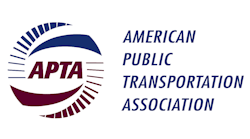The one word to summarize where the transit industry’s focus is, “communication.” With the unpredictable environment in Washington, D.C., there was a call to action of the importance of communicating the benefits of public transportation at the American Public Transportation Association’s (APTA) Marketing & Communications Workshop in Tampa, Florida.
David Longo, acting associate administrator for communications & congressional affairs at the Federal Transit Administration (FTA), stressed the importance of communication. Longo said it will take communication of agencies to ensure the message of what it is that transit delivers to communities and why it matters to real people to ensure transit funding doesn’t get lost.
APTA Chair and Foothill Transit Executive Director Doran Barnes said with it being one of the most pivotal times in Washington, D.C., the industry needs to be as loud a voice in D.C. as it can as there are a lot of people there making noise. “Show the transit benefits front and center,” he said. “If we don’t deliver our message … we could be drowned out.”
The opening session at the Marketing & Communications Workshop was a CEO roundtable talking about why marketing and communications play such an integral role in a transit agency.
Pinellas Suncoast Transit Authority (PSTA) Chief Executive Officer Brad Miller shared the recent history of PSTA’s hotly debated and failed transit ballot referendum from two years ago. The opposition was very vocal, which Miller said made some in the community start to question the need for transit.
PSTA made a push to be out in the community on all fronts, including Miller's weekly message, which is emailed to their email list and posted to the PSTA Facebook page. He said, "It's another way of constantly being out there and telling our story.” The time and effort has paid off. “There has been a sea change in the way the agency is viewed. They’re getting the message we want them to hear.”
He added, “If you’re not communicating, it’s not silent. Everyone else is filling that void.”
Hillsborough Area Regional Transit Authority (HART) Chief Executive Officer Katharine Eagan gave an example of working in an environment of conflicting messages. There was a local newspaper that had a story looking at the funding levels of HART compared to public transportation in another city. Eagan explained the Tampa area is a top 20 metro area if you look at the census bureau, but transit spending is not at a top 20 transit level. She said, “That’s not the message we wanted out there.” She said she met with the editorial advisory board and went out in the community to get their message out there, but it was important to respond without being offensive.
She also talked about the importance of using your own voice. While you need to have the right message and need to finesse it, she stressed, “Your voice is your voice; it is authentic for you.”
Barnes talked about one of the ways transit management has evolved over the years. They have to manage their money, their program and their message.
Managers used to be primarily focused on managing the program, and some still are. However, he said, "That’s shifting in a big way.
“If you don’t have the message, you’re not getting the money,” Barnes said. “It all starts with the message; you’ve got to communicate.”




